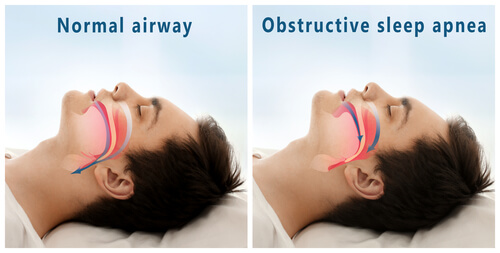Obstructive Sleep Apnea - DRHC Dubai Pulmonary Medicine Clinic
What is Obstructive sleep apnea syndrome (OSAS)?
Snoring is one of the main symptoms of obstructive sleep apnea (OSA). Daytime sleepiness. Fatigue despite adequate sleep, morning headaches, insomnia and difficulty in concentration, depression, forgetfulness, high blood pressure, high blood sugar, impotence, weight gain, and increased nighttime urination may be caused by OSA. Patients with OSA are rarely aware of it; symptoms may be present for years or even decades without identification
What are the reasons for sleep apnea?
During sleep, muscles will relax (including the muscles of the tongue and the soft palate) which will cause narrowing in the back of the throat. This will interfere with the breath and it will cause snoring (the sound of the passed air through the narrowed airway). If the collapse of the airway is complete, then the breath will stop, and this is called apnea. Frequent apneas will lead to frequent neurological arousals Which rarely result in complete awakening, but can have a significant negative effect on the quality of sleep and the patient may suffer from fatigue and drowsiness the next day
What are the factors that can contribute to sleep apnea?
Most individuals with OSA suffer from obesity but Obesity is not always present. A smaller than normal jaw, large tongue, and enlarged tonsils can be factors too. Old-age Men and post-menopause women are at increased risk of developing sleep apnea. Lifestyle factors such as smoking and alcohol may also increase risk of OSA
How do you diagnose OSA?
Diagnosis is based on a combination of patient history and a polysomnography.
What is Polysomnography?
A polysomnogram is an overnight sleep study. A trained sleep technician will prepare you for the test and apply sensors to the head, face, chest, abdomen, and legs. None of these devices hurt, so he will monitor the physiological indicators during sleep including Brain waves, Heart rate, Breathing rate, and Oxygen level.
What is the treatment of sleep apnea?
There is a variety of treatments for OSA. This involves lifestyle changes, such as avoiding alcohol and sedative medications, losing weight, and quitting smoking. Some people use special pillows or oral appliances to keep the airway open during sleep.
What is the Specific treatment for sleep apnea?
Continuous positive airway pressure (CPAP), in which a facemask is attached to a tube and a CPAP machine that blows pressurized air into the. Mask and through the airway to keep it open. There are also surgical procedures intended to remove any tightened tissue and widen the airway; some individuals may need a combination of therapies to successfully treat their condition
What are the Potential risks of untreated sleep apnea?
Untreated sleep apnea may put you at risk of a number of life-threatening conditions including heart attack, stroke, hypertension, diabetes, and even other diseases.
.png?width=281&height=59&name=bookanappointment%20(1).png)
Dubai Pulmonary Medicine Clinic - Are you suffering from chest pain, asthma, or sleep apnea? Dr. Rami Hamed Center provides one of the leading pulmonologists in Dubai. To book your an appointment please call at +97142798200 today!




.png?width=281&height=59&name=bookanappointment%20(1).png)

-1.webp?width=800&height=800&name=19-2%20(1)-1.webp)
